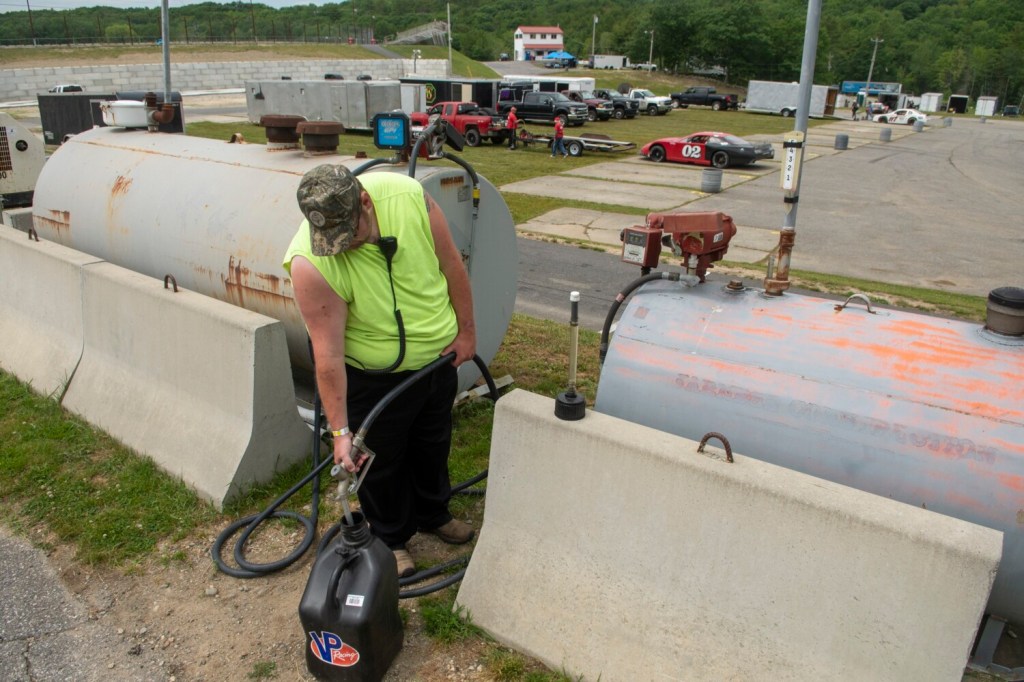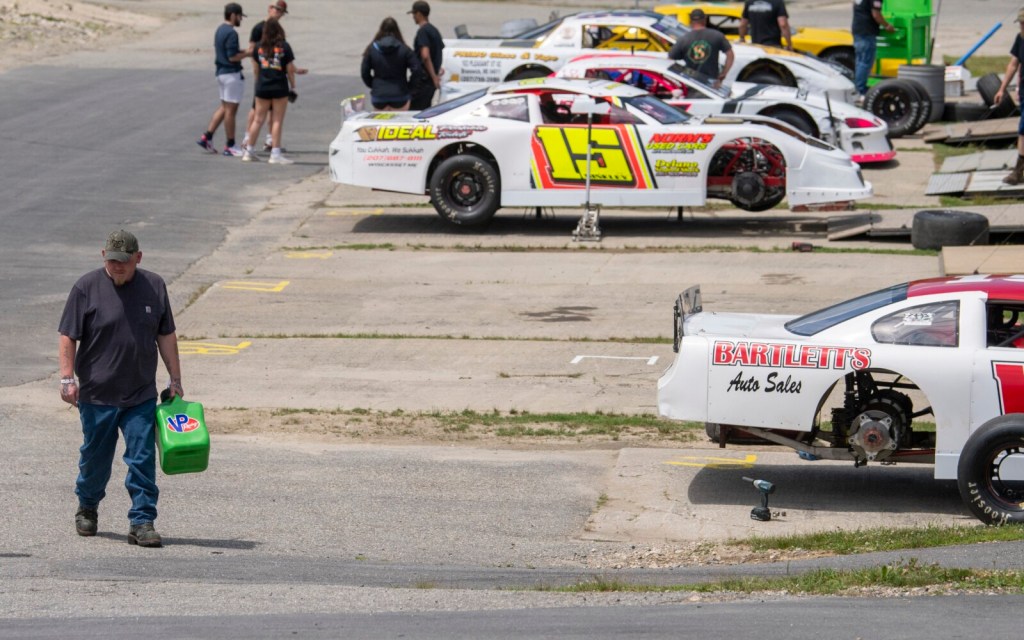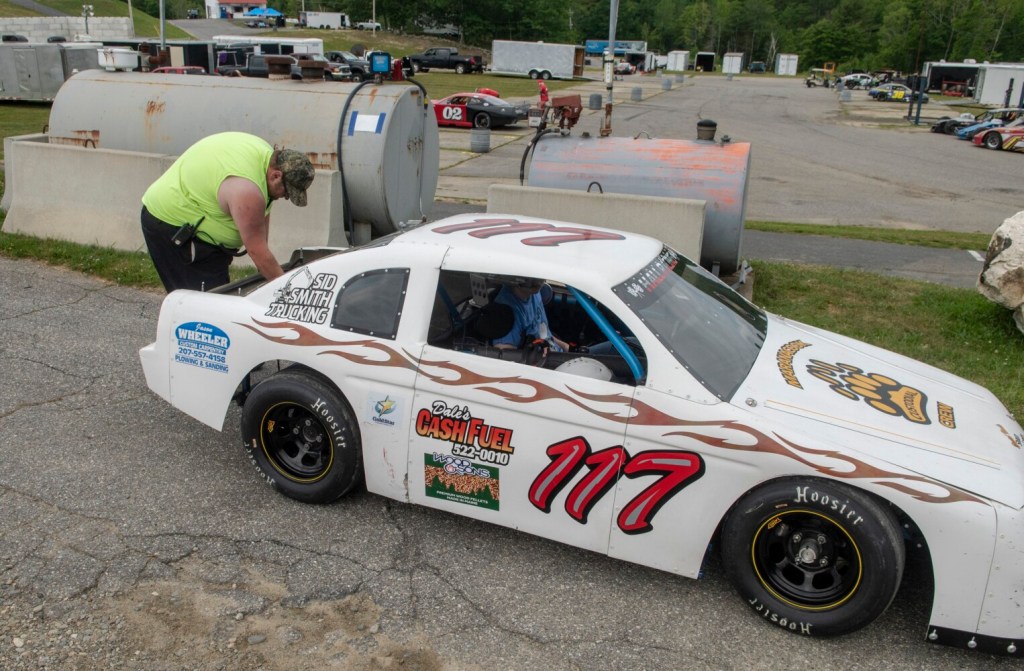WISCASSET — Staying competitive has never been a cheap endeavor in the world of motorsports. These days, it’s an even costlier task.
From event fees to assembly to basic upkeep, just being able to put a quality car on the racetrack is something that can put quite a dent in a racing team’s wallet. Those things have all become more expensive — as, of course, has the skyrocketing cost of fueling a vehicle.
“Everything is more expensive now,” said Daniel Harding Jr. of Fairfield, crew chief for his son of the same name at Wiscasset Speedway. “It takes a big trailer, a big truck and expensive fuel just to get here. The cost of living is up, and that’s how it is in racing, too.”
Racing teams, though, are an ever-creative bunch, and with midsummer’s arrival, drivers and crews have to be in top shape. Even if the rising costs are a pain, those who call Maine racetracks home on late-spring and summer weekends are finding ways to make do.
Rising gas costs are familiar to anyone who relies on an automobile for transportation anywhere in the world. Those driving fossil fuel-powered vehicles are getting less for their buck, whether they’re driving to work daily or taking laps around the racetrack.
Ronald Hall, whose son, Josh, has been a regular winner at Wiscasset Speedway this year, said his team goes through an average of 4 gallons of racing fuel per day. That fuel now costs $13, an increase of roughly $2 that adds up quickly for teams that do as much racing as his.
“I usually buy $60 worth of fuel per day,” Hall said. “The cost of it does hurt, but when you do a lot of racing and love it as much as we do, you have to make it work, so to speak. We just try to put aside as much as we can to pay for the extra amount of fuel.”
For younger racers, the rising fuel and repair costs can be an even bigger obstacle. Generation Z hasn’t had time to amass the savings of its predecessors, making it even more difficult for some of the sport’s newcomers to find the cash necessary to cover the exorbitant expenditures.
In response, those younger drivers have had to find ways to become more resourceful. Adreonna Dodge of Auburn, who races in the Thunder 4 Mini series, has done that by constantly being on the lookout for sponsorship opportunities that she said have been able to cover most of her financial needs.

Driver Adreonna Dodge, of Auburn, puts racing fuel into the tank of her 2002 Honda Civic that she races in the Thunder 4 class Saturday at Wiscasset Speedway. Joe Phelan/Kennebec Journal
“I’ve been going out and getting my sponsors, and those sponsors have pretty much been able to cover my whole ride,” said Dodge. “I put in a little bit, but I can basically rely on them with the costs this year. … That’s good because there’s been a big rise in all of those costs this year. It’s definitely been noticeable.”
Mechanic and inventory shortages have increased the cost of repairs, which are needed frequently in a sport that involves fiberglass shells traveling in close proximity at blazing speeds. According to Cox Automotive, the average auto repair cost at the end of 2021 was 20 percent higher than it was at the same time two years earlier, and repairing race cars has been no exception.
Just as mechanic and auto body shops need to profit from their labor, so, too, do the racetracks that host the events on a weekly basis. Yet while race-day costs can be a bit steeper at some other tracks, Harding said, fees and prices at Wiscasset have been kept very reasonable.
“Wiscasset does a very good job of keeping things affordable,” Harding said. “The parts they sell — parts, tires, fuel — are very affordable, and they make being able to race affordable. For us to get into the race, it’s only $40, and for spectators to come watch, it’s $5. The Jordans deserve a lot more appreciation than they get for keeping it so affordable.”
Racing teams, Hall said, anticipate and budget their prospective spending well in advance. Although the motorsports world can always throw a few variables into the mix, there’s enough consistency to make racing teams less susceptible to surprise costs.
“The cost of racing one of these is consistent from week to week, so you pretty much know what you’re going to spend,” Hall said. “The only way you don’t know is if you crash, but that’s just what happens in racing.”
Comments are not available on this story.
Send questions/comments to the editors.







